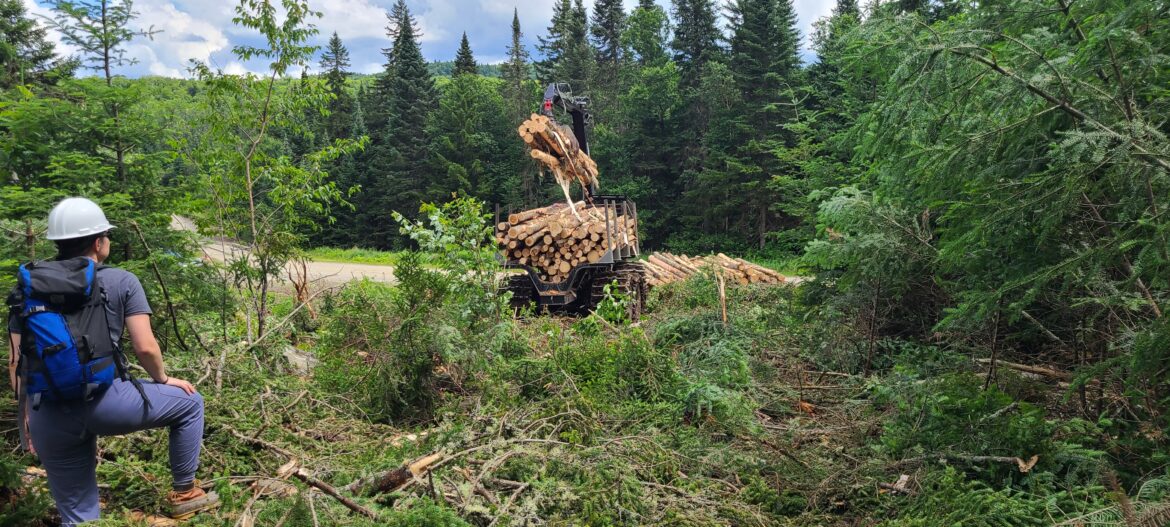By PAULA TRACY, InDepthNH.org
PITTSBURG – The “carbon-first” approach to managing the 145,000-acre Connecticut Lakes Headwaters tract rather than logging represents a breach of contract, members of the Coos County Commission charged at a meeting here Friday, urging state officials to oppose a 10-year plan offered by the landowner that reduces logging.
The state, which holds an easement to allow for cutting and recreation on the tract, rejected the first plan offered in January by Aurora Sustainable Lands, the new owners. A revised plan offered in July, which increases its logging goals. is now under consideration.
Many attending the meeting of the Connecticut Lakes Headwaters Citizens Committee, including a number of state Representatives, said they are not pleased with the current proposal from Aurora.
More than 20 years ago, when the state’s largest private forest tract at its very northern tip came on the market, the state and federal government spent millions of dollars to craft an easement to protect the land for logging, snowmobiling, hunting and open space while allowing the land to be privately owned and logged. Two previous owners did that and had 10-year plans to cut approved.
The easement terms limit what the landowners can and cannot do and the 10-year master plan drives those terms with the state approving the terms. It was set up in part to encourage and allow for logging.
But the plan never envisioned the property becoming a “carbon credit farm” where the trees have more value standing and being used by corporations to offset their carbon footprint.
Aurora “taps into the planet’s oldest and most cost-effective carbon removal tool, trees, to deliver nature-based carbon credits with unrivaled reliability, durability, and quality to our customers,” according to its website.
The trees grow faster than that in terms of cords per year, about 60,000 cords a year, they were told.
It has planned to reduce the harvesting of logs. In past years more than 20,000 cords were cut. Last season about 15,000 cords were cut.
“We’re trying to get to mutual ground here,” said Patrick Hackley, state forester.
Some argued that the new owners are currently not in compliance with the current 10-year plan.
Towns count on timber tax revenue for income and are losing it in Pittsburg, Stewartstown, and Clarksville. That revenue has dropped significantly and it also impacts the county coffers.
Richard Roy, who owns a sawmill, said he has lost 20 percent of the logs he used to get from the tract and now his workers are down to four days a week and he is having to go as far as New York to source wood.
The fact his workers are down 50 days of work a year has a multiple effect on the region’s economy and is “a real issue,” Roy told the advisory commission and Sarah Stewart, commissioner of the state Department of Natural and Cultural Resources who attended the packed meeting Friday morning at the Pittsburg Fire Station.
A 40-page response from the county commission, which was summarized during the meeting Friday of the advisory committee, said the plan is “fundamentally incompatible” with the easement, and urged the state Department of Natural and Cultural Resources to recognize this.
The Attorney General’s Office is also looking at the terms of the easement in concert with the state DNCR.
The commissioners said they want the state to investigate the previous decision to register the forest tract with the California Air and Resources Board for carbon capture as being non-conforming with the easement.
Aurora, which assumed ownership from the Forestland Group which registered the tract with CARB, is planning to increase the rates for camp owners on the land.
Aurora’s regional director of forest operations, Shawn Hagan, said recreation fees are also being reviewed.
In addition to the 10-year plan to cut wood on the tract, which is still on the table, the gathering heard about how rain storms in July devastated the road system in the Connecticut Lakes Headwaters tract.
The state has the responsibility of maintaining the roads for both recreation and logging, with the landowner paying the state for what use they have of them.
State officials said the storms, particularly one on July 10 dropped more than 6 inches of rain in 12 hours and damaged 43 stream crossings on the 25,000 acres within the tract owned by Fish and Game for habitat protection.
This has set up an expensive and lengthy repair, which may cost more than $700,000 but for most of which, is reimbursable up to 75 percent by the Federal Emergency Management Agency, meeting goers were told.
Johanna Lyons, state park planning and development specialist for the state Division of Parks DNCR, said the state is trying to get to the “lowest hanging fruit first” and some roads are reopening soon while some will not be completed until next summer.
In most cases where bridges need to be replaced, the plan is to upsize them where possible to be higher by about 32 inches to allow for future storm damage.
The meeting was attended by many local state Representatives and town officials as well as loggers, abutters, leaders of Fish and Game and DNCR along with camp owners. Others, including InDepthNH.org, attended by video or phone.





